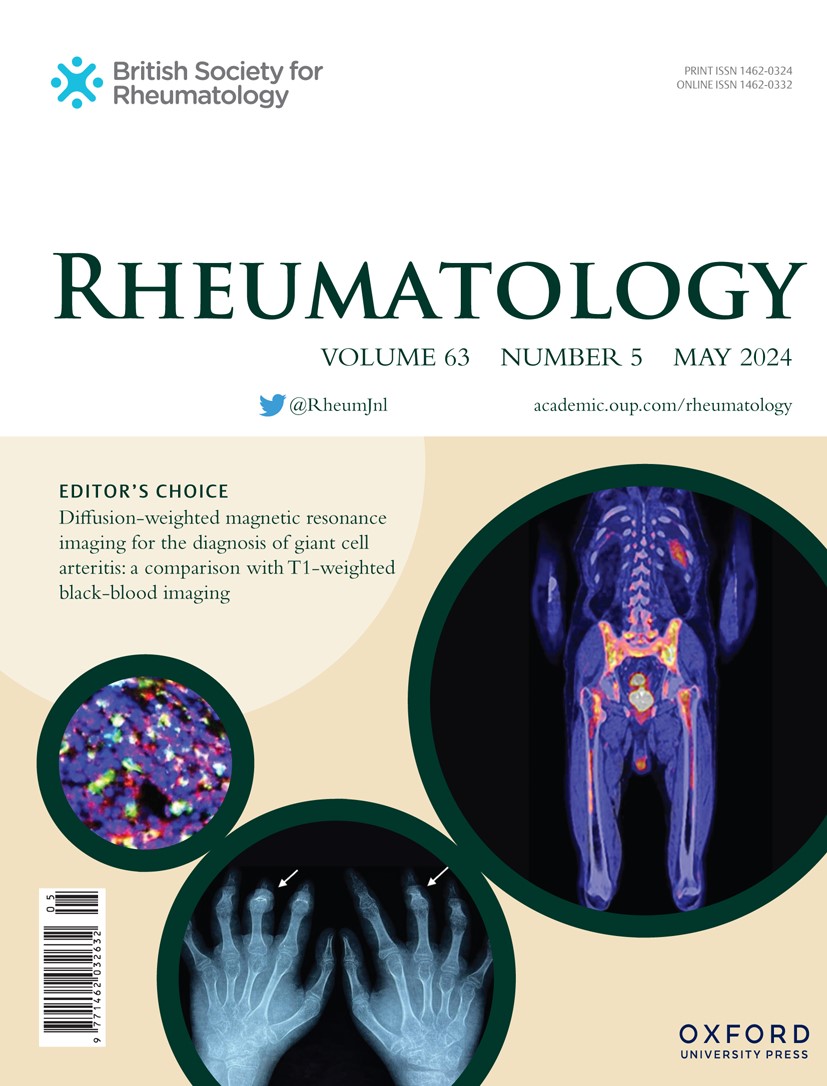Short Form-36 psychometric properties in idiopathic inflammatory myopathies: reliability, validity, and responsiveness
IF 4.7
2区 医学
Q1 RHEUMATOLOGY
引用次数: 0
Abstract
Objective To evaluate the psychometric properties of Short Form-36 (SF-36) as a health-related quality of life (HRQoL) measure in idiopathic inflammatory myopathies (IIM). Methods Patients fulfilling the EULAR/ACR classification criteria or with myositis specific antibodies were enrolled from two clinical trials (Tocilizumab in Myositis and Abatacept in Myositis) and one prospective observational study. Data collection at 0, 3 and 6 months included all myositis core set measures (CSMs) including manual muscle testing-8 (MMT-8), and SF-36 summary scores and all 8 subdomains including physical summary score (PCS) and physical function. Test-retest reliability (Pearson correlation), validity (association with other valid measures) and responsiveness using clinically important difference (CID) and effect size were calculated. Results The study included 105 IIM patients (44% dermatomyositis, 30% anti-synthetase syndrome, 18% polymyositis, 8% necrotizing myopathy), with mean age: 52.3 years, 64% females, and 85% White. HRQoL scores were significantly lower in IIM compared with the general population. All SF-36 domain scores were significantly lower in patients with active disease and muscle weakness. All SF-36 components demonstrated good test-retest reliability at 1 month (p< 0.001), with significant baseline and longitudinal associations with most myositis CSMs. Changes in MMT-8 strongly correlated with changes in PCS and physical domains. PCS illustrated significant and concordant change with 2016 ACR/EULAR myositis response criteria and physician/patient assessments of change, showing a large effect size. We present preliminary CIDs based on a cohort with minimal clinical change Conclusion SF-36 demonstrates good reliability, validity and responsiveness in IIM, and should be utilized for assessing HRQoL in clinical practice and myositis trials.特发性炎症性肌病心理测量特征简表36:信度、效度和反应性
目的评价短表36 (SF-36)作为特发性炎性肌病(IIM)健康相关生活质量(HRQoL)指标的心理测量特性。方法从两项临床试验(Tocilizumab治疗肌炎和Abatacept治疗肌炎)和一项前瞻性观察研究中招募符合EULAR/ACR分类标准或具有肌炎特异性抗体的患者。在0、3和6个月收集的数据包括所有肌炎核心集测量(csm),包括手动肌肉测试-8 (MMT-8)和SF-36总结评分,以及所有8个子域,包括物理总结评分(PCS)和物理功能。使用临床重要差异(CID)和效应量计算重测信度(Pearson相关)、效度(与其他有效测量的关联)和反应性。结果纳入IIM患者105例(皮肌炎44%,抗合成酶综合征30%,多发性肌炎18%,坏死性肌病8%),平均年龄52.3岁,女性64%,白人85%。IIM患者的HRQoL评分明显低于一般人群。活动性疾病和肌肉无力患者的SF-36结构域评分均显著降低。所有SF-36组件在1个月(p<;0.001),与大多数肌炎csm有显著的基线和纵向关联。MMT-8的变化与PCS和物理域的变化密切相关。PCS与2016年ACR/EULAR肌炎反应标准和医生/患者对变化的评估显示出显著和一致的变化,显示出很大的效应量。结论SF-36在IIM中具有良好的信度、效度和反应性,可用于临床实践和肌炎试验中评估HRQoL。
本文章由计算机程序翻译,如有差异,请以英文原文为准。
求助全文
约1分钟内获得全文
求助全文
来源期刊

Rheumatology
医学-风湿病学
CiteScore
9.40
自引率
7.30%
发文量
1091
审稿时长
2 months
期刊介绍:
Rheumatology strives to support research and discovery by publishing the highest quality original scientific papers with a focus on basic, clinical and translational research. The journal’s subject areas cover a wide range of paediatric and adult rheumatological conditions from an international perspective. It is an official journal of the British Society for Rheumatology, published by Oxford University Press.
Rheumatology publishes original articles, reviews, editorials, guidelines, concise reports, meta-analyses, original case reports, clinical vignettes, letters and matters arising from published material. The journal takes pride in serving the global rheumatology community, with a focus on high societal impact in the form of podcasts, videos and extended social media presence, and utilizing metrics such as Altmetric. Keep up to date by following the journal on Twitter @RheumJnl.
 求助内容:
求助内容: 应助结果提醒方式:
应助结果提醒方式:


